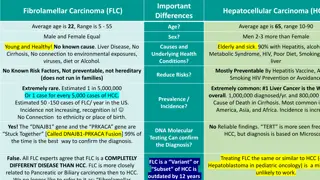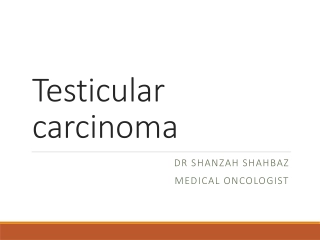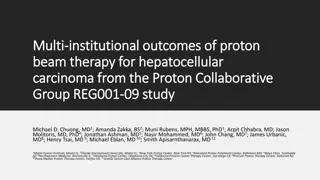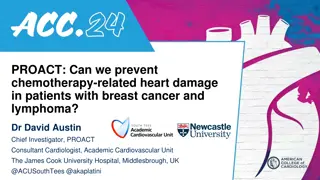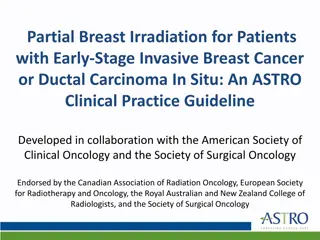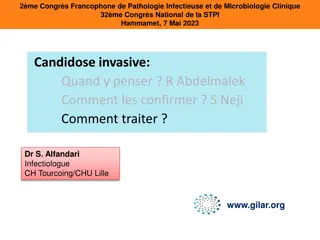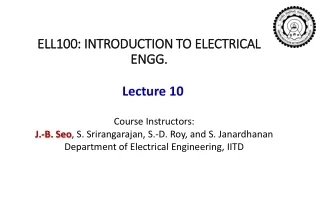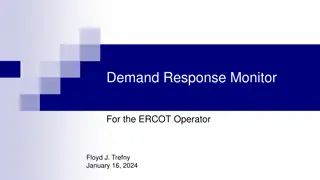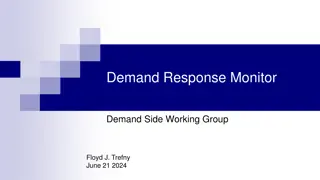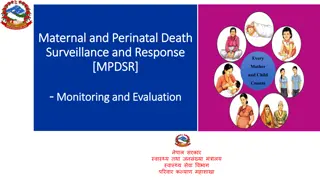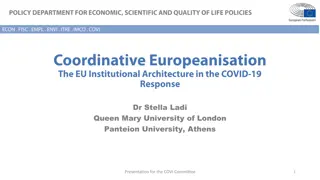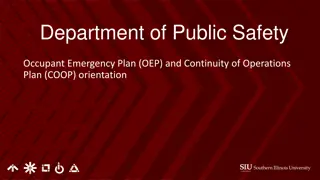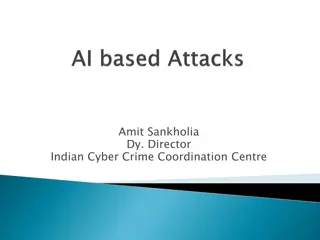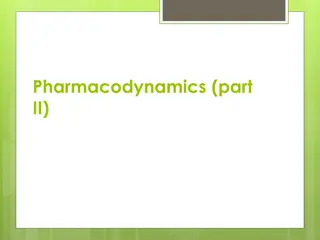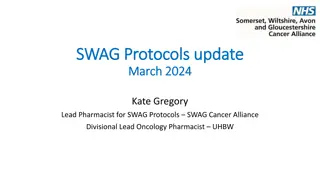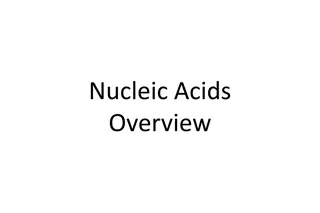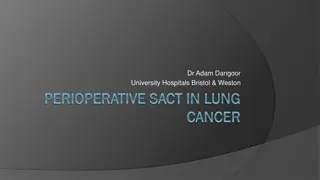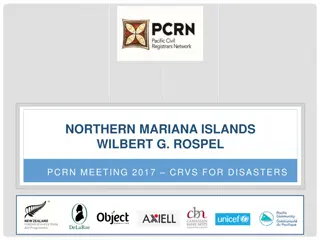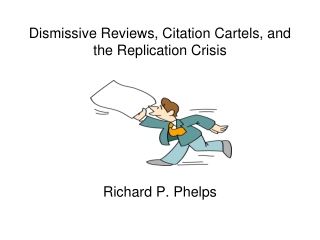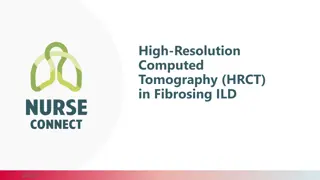Oncological Perspective on Invasive Lobular Carcinoma: Challenges and Response to Chemotherapy
Guidelines and characteristics of invasive lobular carcinoma, focusing on oncological challenges, response to chemotherapy, and prognosis after neo-adjuvant treatment in patients. Highlights the importance of considering histology type for tailored treatment decisions. Discusses the effectiveness of neo-adjuvant chemotherapy in locally advanced breast cancer, particularly in infiltrating lobular breast carcinoma cases. Studies also indicate the need to reconsider surgery options for patients with different hormonal receptor statuses.
Download Presentation
Please find below an Image/Link to download the presentation.
The content on the website is provided AS IS for your information and personal use only. It may not be sold, licensed, or shared on other websites without obtaining consent from the author. Download presentation by click this link. If you encounter any issues during the download, it is possible that the publisher has removed the file from their server.
Presentation Transcript
Oncological perspective on Invasive lobular carcinoma Anne Sofie Brems-Eskildsen Department of Oncology, University Hospital of Aarhus
Guidelines in Oncology for ILC follows IDC ASCO Guidelines for early breast cancer (not mentioned) St. Gallen Guidelines for early breast cancer (not mentioned) DBCG systemic treatment (not mentioned) There is a lot of myths and expectations We tends to consider the histology type in the daily clinic Research area of growing international interest Challenges in the oncologic treatment: Chemotherapy? Response to HER2 targeted therapy? Considerations regarding radiotherapy? Metastatic pattern and challenges
Characteristics of invasive lobular carcinoma 5-15% of all breast cancers cases Associated with ER positive Her2 normal Large, multifocal growing tumors Often lymph node negative Slow growing, lower grade Older women Often diagnosed in a more locally advanced stage The metastatic pattern are different.
Chemotherapy response? Should we use neo-adjuvant chemotherapy in locally advanced breast cancer?
Response and prognosis after neo-adjuvant chemotherapy in 1,051 patients with infiltrating lobular breast carcinoma Sibylle Loibl et al Breast Cancer Res Treat (2014) 144:153 162 One of the larges studies regarding response to chemotherapy is from 2014 and includes 1051 patients with ILC. ILC 6,2% 4,2% Non-ILC 17,4% pCR rate (p=0,001) pCR grade 1-2 ER negative or positive pCR grade 3 or ER negative pCR grade 3 and ER negative 9020 patients were included in neo- adjuvant trials in Germany 11,7% were pure ILC 7% 17% Neo-adjuvant chemotherapy is not effective in pure lobular cancer and the treatment should not be offered routinely Mastectomy pCR p= 0,037 Mastectomy non-pCR p=0,0001 27,4% 41,8% 16,6% 31,5% Upfront Aromatase inhibitor may be better? But no data so far.
Sibylle 2014: Higher frequency of mastectomy despite pCR The mastectomy rate was considerably high in ILC patients even after obtaining a pCR. They therefore, suggest to offer NACT mainly to ILC patients with HR-negative tumours The indications should not be the shift in type of surgery
Sibylle 2014 No significant association between pCR and better distant disease free survival (DDFS), but between pCR and overall survival.
What about Trastuzumab? HERA 2013 The HERA trial randomized between 1 year adjuvant trastuzumab vs observation in HER2 positive patients. 187 patients with ILC and 3213 patients with IDC
Trastuzumab and invasive lobular cancer: First, a diagnosis of lobular histologic subtype does not equal HER2 negativity and HER2 testing should be carried out Second, patients diagnosed with early-stage, HER2- positive ILC should be offered 1 year of adjuvant trastuzumab. And finally, HER2-positive ILC treated with trastuzumab will derive a benefit of a magnitude similar to patients with the IDC histologic subtype And we expect the same in the neo-adjuvant setting.
ER targeted neo-adjuvant therapy? We can consider neo-adjuvant anti- hormone treatment in combination with CDK4/6 inhibitor treatment instead of chemotherapy. Maximum response after 6-9 months. But no randomized trials
Higher risk of local recurrence and therefore lobular carcinomas are not included in partial breast radiation trials
Radiation therapy considerations in lobular carcinomas Risk of local recurrence after mastectomy was 18% compared with 6% for other types. Radiation was given on the indication (>5 cm tumor or macro metastasis)
Where is the clip marked lymph node? Where is the known lymph node metastasis in the internal mammary gland? (IC2)
Metastatic ILC/IDC Treatment and outcome in metastatic lobular breast cancer in the prospective German research platform OPAL M. Thill1 M.-O. Zahn2 A. Welt3 E. Stickeler4 A. Nusch5 T. Fietz6 J. Rauh7 N. Wetzel8 L. Kruggel8 M. J nicke8 N. Marschner9 N. Harbeck10 A. W ckel11 T. Decker12 the OPAL study group Received: 7 December 2022 2566 patients with metastatic breast cancer treated in Germany in routine care 2007-2021. n=466 ILC and n=2100 IDC Characteristics of invasive lobular carcinomas: Patients were older (median 69 vs. 63 years) lower grade (G1/G2: 72.8% vs. 51.2%), hormone receptor (HR)-positive (83.7% vs. 73.2%) less often HER2-positive (14.2% vs. 28.6%) tumours, metastasized more frequently to the bone (19.7% vs. 14.5%) peritoneum (9.9% vs. 2.0%) less frequently to the lungs (0.9% vs. 4.0%)
Metastatic invasive lobular vs. invasive ductal carcinomas Median OS: metastatic invasive lobular carcinoma (n=209) 30.2 months [95% CI 25.3, 36.0] metastatic invasive ductal carcinomas (n=1158) 33.7 months [95% CI 30.3, 37.9] Multivariate survival analysis did not show a significant prognostic impact of the histological subtype HR mILC vs. mIDC 1.18 (95% CI 0.97 1.42)
Conclusion The guidelines regarding medical oncology in early breast cancer does not include histology type. NACT is offered to patients with locally advanced invasive lobular carcinoma. Expect less effect. In some cases can we consider neo-adjuvant treatment with anti-hormone/CDK4/6 treatment, but no randomized trials Adjuvant chemotherapy is offed to patients with risk factors (like IDC) HER2 positive tumors do benefit from HER2 targeting therapy We will not offer partial breast radiation for patients with invasive lobular cancer In the metastatic setting the cancer cells seems to have a preference to mucosa and peritoneum and we should be aware of clinical progression. (non-evaluable in RECIST)


